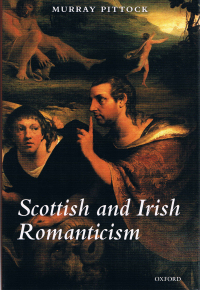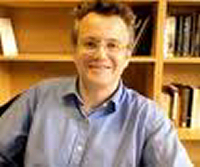|
Edited
by Frank R. Shaw, FSA Scot, Dawsonville, GA, USA
Email:
jurascot@earthlink.net
 For
years the name Murray Pittock has been popping up in conversations with
Scots on both sides of the pond, and I had wanted to meet him for as long. I
recently ran across his name again when I read The Ultimate Burns Supper
Book by Clark McGinn. Pittock and McGinn go back a long way - 32 years - and
Pittock wrote the foreword for Clark’s book. Finally the opportunity to meet
Murray via email presented itself through Keith Dunn, a friend in the Burns
Club of Atlanta, who recommended Pittock’s book Scottish and Irish
Romanticism. Intrigued by the title, I introduced myself to Dr. Pittock
through a couple of Scottish friends. Having secured a copy of his book, I
learned it was “designed for reading by advanced scholars, postgraduate and
postdoctoral researchers, senior undergraduates, and all those with an
interest in Romanticism or in how Irish and Scottish studies intersect with
other English literature.” Having failed to qualify in the first four
categories, I convinced myself I might qualify as a part of the last group. For
years the name Murray Pittock has been popping up in conversations with
Scots on both sides of the pond, and I had wanted to meet him for as long. I
recently ran across his name again when I read The Ultimate Burns Supper
Book by Clark McGinn. Pittock and McGinn go back a long way - 32 years - and
Pittock wrote the foreword for Clark’s book. Finally the opportunity to meet
Murray via email presented itself through Keith Dunn, a friend in the Burns
Club of Atlanta, who recommended Pittock’s book Scottish and Irish
Romanticism. Intrigued by the title, I introduced myself to Dr. Pittock
through a couple of Scottish friends. Having secured a copy of his book, I
learned it was “designed for reading by advanced scholars, postgraduate and
postdoctoral researchers, senior undergraduates, and all those with an
interest in Romanticism or in how Irish and Scottish studies intersect with
other English literature.” Having failed to qualify in the first four
categories, I convinced myself I might qualify as a part of the last group.
It did not take me long to realize that this publication was different from
any I had ever read. Upon completion I was reminded that the professors I
learned the most from during my undergraduate and graduate work were those
who demanded the most out of me. I may not have made my best grades with
them, but 45 years later I remember them and their courses more than some of
those I “aced” in college and graduate school. The same goes for Scottish
and Irish Romanticism.
If you like to read about literature, particularly Scottish, and its place
in world literature, this is as good as it gets! You may not agree with all
of the conclusions Pittock presents, but you will agree you have been
challenged to learn more than probably ever before. Here one finds new
material on many subjects. Among others I was impressed by what I found on
Allan Ramsay, Robert Fergusson, Robert Burns, Sir Walter Scott, Thomas
Moore, James Hogg, and Maria Edgeworth. Interestingly, every chapter would
use more than the person’s name to describe the chapter as in “Scott and the
European Nationalities Question” or in “Allan Ramsay and the Decolonization
of Genre”. BUT when you come to the Bard of Scotland, the chapter on him is
simply entitled “Robert Burns”. Enough said!
You’ll learn how Burns “was expelled” from British Romanticism (American,
too). Burns’ decline was evidenced by his not even being considered for a
place in romanticism and Pittock points out that even “scholars often acted
as if his poetry did not exist.” Case in point, I am aware of a Burns book
collector with a pretty fair collection who was told by his university that
there was no place for his books in their system because there was no one to
teach Burns. Interpret that as the university not being interested. This
suppression of Burns is similar to Johnson’s suppression of Scots as found
in his Dictionary. Some of the authorities, if they considered Burns at all,
had categorized him, along with Fergusson, as a “peasant poet”. Ironically,
their suppression and lowly criticisms have not kept him out of the hearts
of Scots all over the world - he is more popular now than ever before. In
fact, in a recent email to me, Dr. Pittock said that “there’s another good
year for Burns ahead…”
In conclusion, you may have to dig a little harder with this book but you
will be rewarded over and over. The 49ers from the Old West used to say,
“There’s gold in them thar hills” and they were amply rewarded by digging
just as you will be for reading and studying this book. It is important to
remember that “the outcomes of Scottish and Irish Romanticism, though
different, were both conditioned by Union: in Ireland in 1801, in Scotland
as part of a process which began in 1707 and ended in 1746.” But wait, there
is so much more and it will be left up to you to discover what awaits you in
this excellent tome. What do I think of Murray Pittock’s book? It is an
interesting book. Impressively written. If you are looking for quiche and
soup go elsewhere. This is a book of heavy, tasty meat! In my opinion Murray
has succeeded in his quest to move Scottish and Irish literature, as well as
Robert Burns, back into the academic arena of world literature and
particularly the so-called British or English literature.
If I were writing a blurb for this book it would simply be “WOW! WHAT A
MASTERPIECE!!”
(FRS: 9.2.10)
 Murray
Pittock is Bradley Professor of English Literature at the University of
Glasgow, Head of the College of Arts and Vice-Principal. He has formerly
held chairs and other senior appointments at Strathclyde, Edinburgh and
Manchester universities. He has been BP Humanities Prize Lecturer at the
Royal Society of Edinburgh, of which he is a Fellow, and Chatterton Lecturer
in Poetry at the British Academy. His recent work includes Scottish and
Irish Romanticism (2008), The Reception of Sir Walter Scott in Europe (2007)
and James Boswell (2007). Forthcoming work includes collections on Robert
Burns in Global Culture, the Reception of Robert Burns in Europe and the
textual edition of the Scottish Musical Museum for the Oxford Burns. He is
currently Principal Investigator of the Arts and Humanties Research Council
Beyond Text project, ‘Robert Burns, 1796-1909: Inventing Tradition and
Securing Memory’. Murray
Pittock is Bradley Professor of English Literature at the University of
Glasgow, Head of the College of Arts and Vice-Principal. He has formerly
held chairs and other senior appointments at Strathclyde, Edinburgh and
Manchester universities. He has been BP Humanities Prize Lecturer at the
Royal Society of Edinburgh, of which he is a Fellow, and Chatterton Lecturer
in Poetry at the British Academy. His recent work includes Scottish and
Irish Romanticism (2008), The Reception of Sir Walter Scott in Europe (2007)
and James Boswell (2007). Forthcoming work includes collections on Robert
Burns in Global Culture, the Reception of Robert Burns in Europe and the
textual edition of the Scottish Musical Museum for the Oxford Burns. He is
currently Principal Investigator of the Arts and Humanties Research Council
Beyond Text project, ‘Robert Burns, 1796-1909: Inventing Tradition and
Securing Memory’.
Scottish and Irish Romanticism by Murray Pittock was published by Oxford
University Press in 2008 and can be purchased at all quality book stores.
ISBN 978-0-19-923279-6.
|

